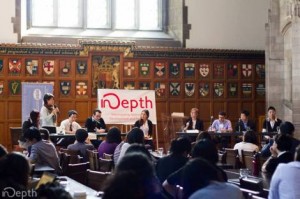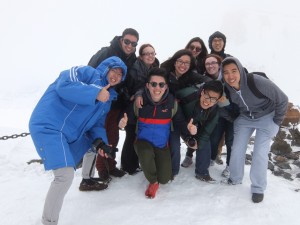Student Resources
The Centre for the Study of Korea supports students in a wide variety of activities at the University of Toronto to connect students with Korea and the field of Korean studies.
Study Programs
The CSK does not itself offer any teaching programs but supports courses on Korea throughout the Faculty of Arts and Science. Please see the Asian Institute’s Contemporary Asian Studies Program, or the Department of East Asian Studies website for further information.
Exchanges
The Faculty of Arts and Science has a number of exchange programs with Korea.
Scholarships
The CSK promotes four scholarships generously offered by the Korea-Canada Scholarship Association. For more information, see the Korean Studies Scholarships.
Graduate Studies on Korea
The University of Toronto is an exciting place to pursue the study of the history, culture and society of Korea within the wider contexts of global modernity, the neoliberal order and critical theory. Learn more here.
2014 INDePth: Re-imagining the Korean Peninsula
 INDePth– Interrogating Notions of Development and Progress – is an annual student-run conference at the University of Toronto. The conference comprises of panels, workshops, unconference sessions, a gala dinner and a Great Debate to not only facilitate intellectually stimulating conversations but also connect undergraduate and graduate students from across the globe. NDePth seeks to foster an environment for university students to apply what they have learned in the classroom and start meaningful conversations about key global issues.
INDePth– Interrogating Notions of Development and Progress – is an annual student-run conference at the University of Toronto. The conference comprises of panels, workshops, unconference sessions, a gala dinner and a Great Debate to not only facilitate intellectually stimulating conversations but also connect undergraduate and graduate students from across the globe. NDePth seeks to foster an environment for university students to apply what they have learned in the classroom and start meaningful conversations about key global issues.
Focusing on the Korean peninsula as a case study, INDePth 2014 featured prominent speakers including Ms. Christine Ahn (Korea Policy Institute), Dr. Michael Robinson (Indiana University), Dr. Hyunjin Seo (University of Kansas). Korea represents a unique case study as, more than twenty years after the fall of the Berlin Wall and the collapse of the Soviet Union, the Korean peninsula is still mired in Cold War era divisions. Its contemporary reality may seem to reinforce traditional balance-of-power politics, however it also showcases the possibilities for a fracturing of global power relations through the dynamism of soft power, media representation, economic development and civil society. The issues surrounding the relationship between the North and South Korea have been commonly discussed in static frameworks where the emphasis tends to be on the diametrically opposed economic, political, and social systems. The conference posed important but complex questions about the two Koreas which allowed delegates to contemplate the overarching issues of security, social change and conflict resolution in the peninsula.
The annual conference is sponsored by the Munk School of Global Affairs and Public Policy, the Asian Institute, Centre for the Study of Korea, Asia Pacific Foundation of Canada and many other organizations and has built networks with Western University, University of Alberta, Carleton University, York University etc.
The Asian Institute’s 2014 ICM to the Yanbian Korean Autonomous Prefecture
 In May 2014, ten undergraduate students went to South Korea and China for ten days as part of a Faculty of Arts and Science International Course Module (ICM) . The ICM was designed to build on CAS400Y: “Critical Perspectives on Asian Modernity” and Professor Andre Schmid’s EAS466H: “Historiography of North Korea,” focusing on the Yanbian Korean Autonomous Prefecture.
In May 2014, ten undergraduate students went to South Korea and China for ten days as part of a Faculty of Arts and Science International Course Module (ICM) . The ICM was designed to build on CAS400Y: “Critical Perspectives on Asian Modernity” and Professor Andre Schmid’s EAS466H: “Historiography of North Korea,” focusing on the Yanbian Korean Autonomous Prefecture.
Seen by Koreans as their ancestral home, the Yanbian Korean Autonomous Prefecture is located in northeast China, and is the largest settlement of ethnic Koreans outside of the Korean peninsula. This border region, described as North Korea’s “lifeline to the outside world,” is where the majority of the DPRK’s trade takes place, as well as being a site for significant South Korean investment. The region is home to the Chaoxianzu, ethnic Koreans who initially settled in Yanbian in the 19th century. Yanbian is considered to be one of China’s only truly bi-cultural societies. However, since the 1990s the area has seen increases in the use of Chinese in everyday speech and the enrollment of Korean children in Chinese language schools. This has happened in conjunction with Chinese economic policies that actively encourage flows of investment, trade, and people from both South and North Korea into China, with many ethnic Koreans moving to South Korea for economic purposes. The module intended to allow these students to study the impact of such cultural and economic policies, and ascertain the effects it has on the shrinking Korean minority population living in China, exploring themes of “integrated” Korean identity, historical memory and migration, and Chinese economic policy towards the DPRK.
The students created a blog, and took turns writing about each day of their trip, sharing their experiences and observations on how different constructions of Korean identity in China interact within a small, accessible geographic area.
Please enjoy their blog, found here: http://icm2014asia.wordpress.com/
While the Centre for the Study of Korea does not sponsor any courses in Korean studies, there is a wide variety of courses that cover numerous aspects of Korea. Below is a selected list of courses offered at the undergraduate and graduate level. For more information about these courses, contact the sponsoring departments.
Undergraduate:
ANT477H1 Transnational Korea in and outside the Peninsula (formerly ANT377H1)
This course addresses reading ethnography as a tool to understand compressed and complex modernity such as Korean societies, both in and outside of the Korean peninsula. In particular, this course aims to develop students’ critical thinking on class, ethnicity, gender, family, and migration in Korea and diasporic societies of Koreans in Canada, China, Japan, and US.
EAS217Y1 Major Aspects of Contemporary Korea
A range of perspectives on contemporary Korea will be addressed. The focus is on the last four decades of political economic and socio-historical change on the Korean peninsula. Focus on South Korea with some consideration of North Korea. Subjects include the developmental state, democratization, neoliberalism, transnationalism, and multiculturalism.
EAS272H1 Post-War Korean Society & Culture
This course offers a critical analysis of South Korean film and literature as a way of understanding the political and cultural contexts of post-Korean War South Korean society and culture. The class is devoted to developing critical perspectives on historical context and cultural representation of Korea. In particular, it introduces students to the ongoing construction of identities about marginalized Koreans through major political incidents, including the Kwangju uprising.
EAS389Y1 History of Korean Religion
This course offers a broad overview of Korean religious tradition.
EAS432H1 Korean Cultural Studies Seminar
The Korean Cultural Studies Seminar provides the opportunity for in-depth reading and research into a specific topic in the cultural and intellectual history of Korea. Topics will vary each semester but might include colonial period print culture, the New Woman, the history of photography, and modernism.
graduate:
EAS1432HS Korean Cultural Studies Seminar Taught by CSK Faculty
EAS 1173H, Y Modern Korean History Seminar Taught by CSK Faculty
EAS 1602Y Topics in Korean Thought
Korean Language Courses
In addition, the department of East Asian Studies sponsors several courses in Korean Language, both at the undergraduate and graduate level. Click here for more information.
CSK offers two different award opportunities for graduate students working on research projects in Korean studies. For more information please go to: https://archive.munkschool.utoronto.ca/csk/graduate-student-fellowships/